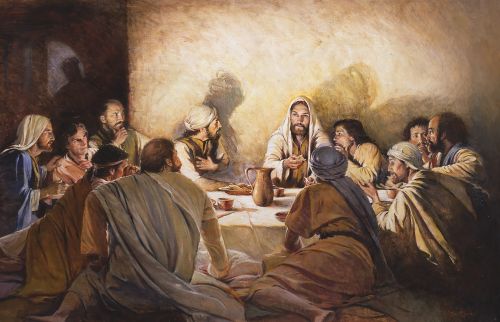To accompany your Come Follow Me study for May 29 – June 4
In addition to reading the indicated chapters, you may wish to:
Read the applicable portions of the New Testament Institute Student Manual at
- Chapter 9: Matthew 26 (churchofjesuschrist.org)
- Chapter 14: Mark 11–16 (churchofjesuschrist.org)
- Chapter 25: John 11–13 (churchofjesuschrist.org)
Read Luke 22:1-23, which covers the same events as Matthew 26, Mark 14, and John 13.
Reread Luke 7:36-50 and John 12:1-11 concerning the details of the supper at the home of Simon the leper, who may have been the father of Judas Iscariot (John 12:4).
Watch any or all of the following related video segments:
- Come Follow Me (May 29-June 4) Matthew 26; Mark 14; John 13 | The Last Supper at Come Follow Me (May 29-June 4) Matthew 26; Mark 14; John 13 | The Last Supper – YouTube
- The Last Supper at The Last Supper – YouTube
- Always Remember Him at Always remember him – YouTube
- The Gospel According to Matthew (from minute 3:30:40-3:54:33) at https://www.youtube.com/watch?v=woAhReBytBk&t=6494s
- The Gospel of Mark Visual Bible (from minute 1:12:03-1:21:50) at https://www.youtube.com/watch?v=BcdgY7V4jZ4&t=1190s
- The Gospel of John (from minute 1:51:00-2:00:08) at https://www.youtube.com/watch?v=kAAZ6HPXdMU
If you would like a Kahoot game related to this material which you could use for personal study or use with your family or your class, click here: https://create.kahoot.it/share/matthew-26-mark-14-john-13/1148d0d4-eaf6-4f33-b529-2d6d3f3c41ca. (To use it with a group, after clicking on this link, you will need to log into Kahoot, creating a free account if you have not done so previously, then click on the blue “Start” button.)
Points to Ponder in Matthew 26; Mark 14; John 13
1. Some of the stories in this week’s reading we have encountered before. What did you notice in this week’s reading about familiar events that was new or seemed worth repeating?
2. Occasionally someone will suggest that Judas was not really trying to betray Jesus but was simply trying to bring about a confrontation between Jesus and the authorities that would force Jesus to step forward and demonstrate his Messiahship by ridding the land of its Roman oppressors. What reasons do we have to believe this theory to be in error?
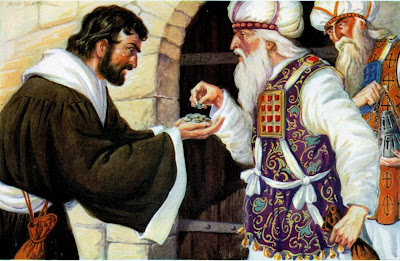
3. When Jesus instructed his disciples to arrange for the Passover meal, he told them to follow “a man bearing a pitcher of water.” How were the disciples to know which man to follow out of all those who might have been carrying such a pitcher?
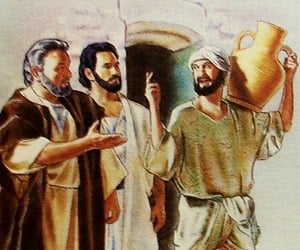
4. What mini-sermon could you give from Matthew 26:22?
5. What have you personally found helpful in making the weekly sacrament ordinance meaningful and new each time?
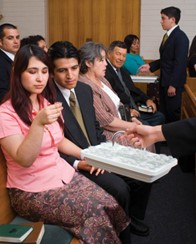
6. What do you consider to be the most significant Joseph Smith Translation contribution to the story of the first sacrament service?
7. What did the singing of a hymn add to the Last Supper? Why do we sing a hymn today just before partaking of the sacrament? (Matthew 26:30)
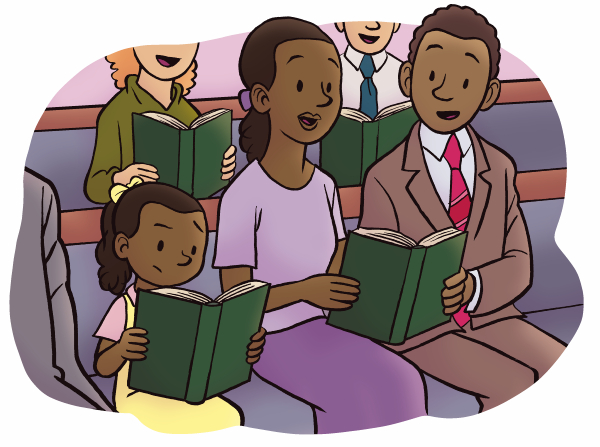
8. Where in modern scripture can we read more about the great latter-day “sacrament meeting” alluded to in Luke 22:16, Matthew 26:29, and Mark 14:25?
9. What connection is there between Luke 22:24-30 and John 13:4-17, which is not immediately apparent unless one reads the two passages sequentially?
10. What was the purpose of Jesus’ washing each of the disciples’ feet? Wouldn’t it have been more efficient and teach more about personal responsibility to let each wash his own feet?
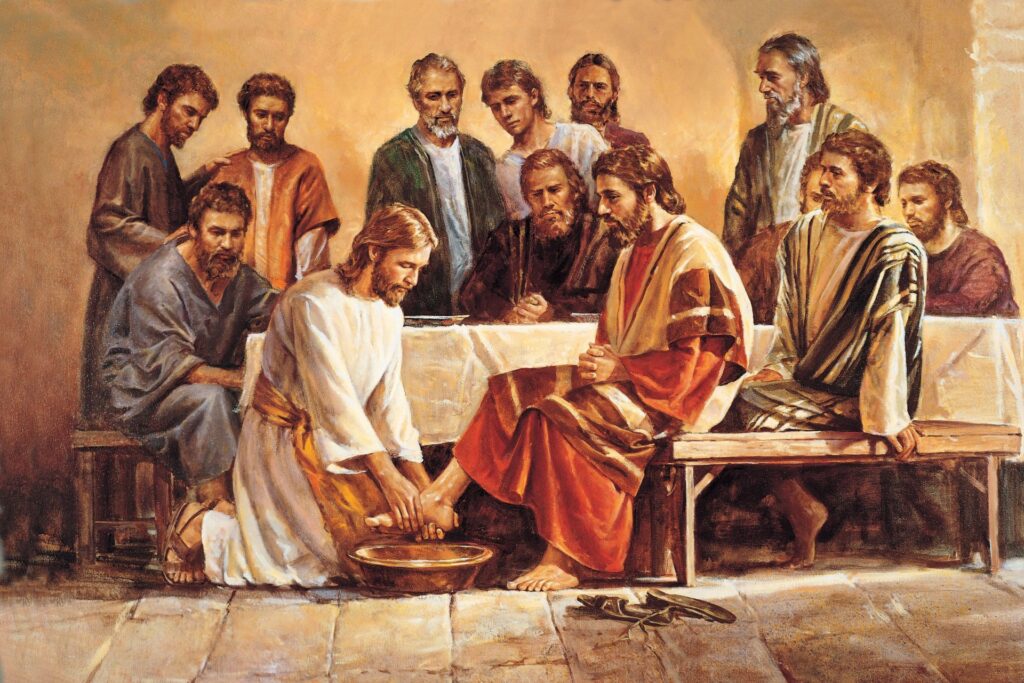
11. What would a typical outsider say was the most characteristic attribute of a Latter-day Saint? That he doesn’t smoke or drink? That he’s devoted to his family? That he’s fanatical in his attendance at meetings? How successful have we been thus far in reaching the point that Jesus dreamed of that “by this shall all men know that ye are my disciples, if ye have love one to another”? (John 13:35.) Why aren’t we better known for that?

12. Jesus had previously taught that one is to love his neighbor as himself. In what sense, then, is it a “new commandment” that He gives in John 13:34-35?

Possible Answers to Points to Ponder in Matthew 26; Mark 14; John 13
1. Some of the stories in this week’s reading we have encountered before. What did you notice in this week’s reading about familiar events that was new or seemed worth repeating?
Your choice. For me, it was to realize that the story of the woman anointing Jesus’ head and feet was the same event as we previously encountered in John 12 and Luke 7. And it was interesting to notice that this was in the home of a Simon the leper, evidently a friend or acquaintance of Mary, Martha, and Lazarus in Bethany, as Martha was serving and Mary was there to anoint Jesus with precious oil. Simon, also a Pharisee, had evidently been previously healed of his leprosy, presumably by Jesus, or he would not have been allowed to socialize with others. But despite his healing, he seems not to have become a disciple of Jesus. We learn, too, that Judas Iscariot was a son of a Simon, quite possibly this same Simon. And it appears that Judas was angered not only by Jesus’ objection to his criticism of Mary’s “wasting” so much precious ointment on Jesus but by Jesus’ complaint about the poor treatment he received from Simon, who should have treated Him with much more courtesy. This anger in Judas seems to be what prompted him immediately to contact the chief priests and offer to betray Jesus.
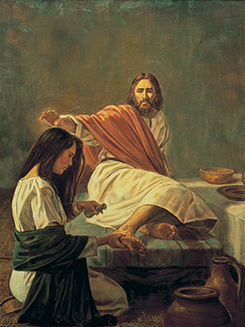
2. Occasionally someone will suggest that Judas was not really trying to betray Jesus but was simply trying to bring about a confrontation between Jesus and the authorities that would force Jesus to step forward and demonstrate his Messiahship by ridding the land of its Roman oppressors. What reasons do we have to believe this theory to be in error?
- Judas went to the chief priests offering to betray Jesus immediately after Jesus had chastised him and others for their objection to Mary’s anointing His head and feet with precious oil. Evidently, Judas’ was angry about it and wanted to get even. The JST version of Mark 14:28 tells us, “he [Judas] turned away from him [Jesus], and was offended because of his words.”
- The record tells us that Judas “sought opportunity to betray him,” not to entice Him to “demonstrate His Messiahship.” (Matthew 26:16.)
- Jesus said (Matthew 26:24) that it would be better for him not to have been born. Such would not be the case with an honest mistake.
- John 13:2 tells us that “the devil … put into the heart of Judas Iscariot … to betray him.”
- John 13:10-11 further tells us that not all the apostles were clean, as He knew who was to betray Him.
- Jesus very specifically told Judas that it was he would betray Him, giving Judas every opportunity to correct his course had he been willing to do so.
- In 3 Nephi 29:7, Jesus evidently refers to Judas as “the son of perdition, for whom there was no mercy.”
3. When Jesus instructed his disciples to arrange for the passover meal, he told them to follow “a man bearing a pitcher of water.” How were the disciples to know which man to follow out of all those who might have been carrying such a pitcher?
In that day and time, it would be expected that women would be carrying pitchers of water, not men. It is therefore unlikely that the disciples would have had any problem in deciding which man to follow.
4. What mini-sermon could you give from Matthew 26:22?
Perhaps: When Jesus announced that one of the apostles would betray Him, they could have started speculating, “It’s probably Matthew. He used to be a publican.” Or, “I’ll bet it’s that old Judas character.” Instead, each asked, “Lord, is it I?” Likewise, we would all do well to look inside ourselves and ask how we can improve rather than be obsessed with the perceived faults of others.
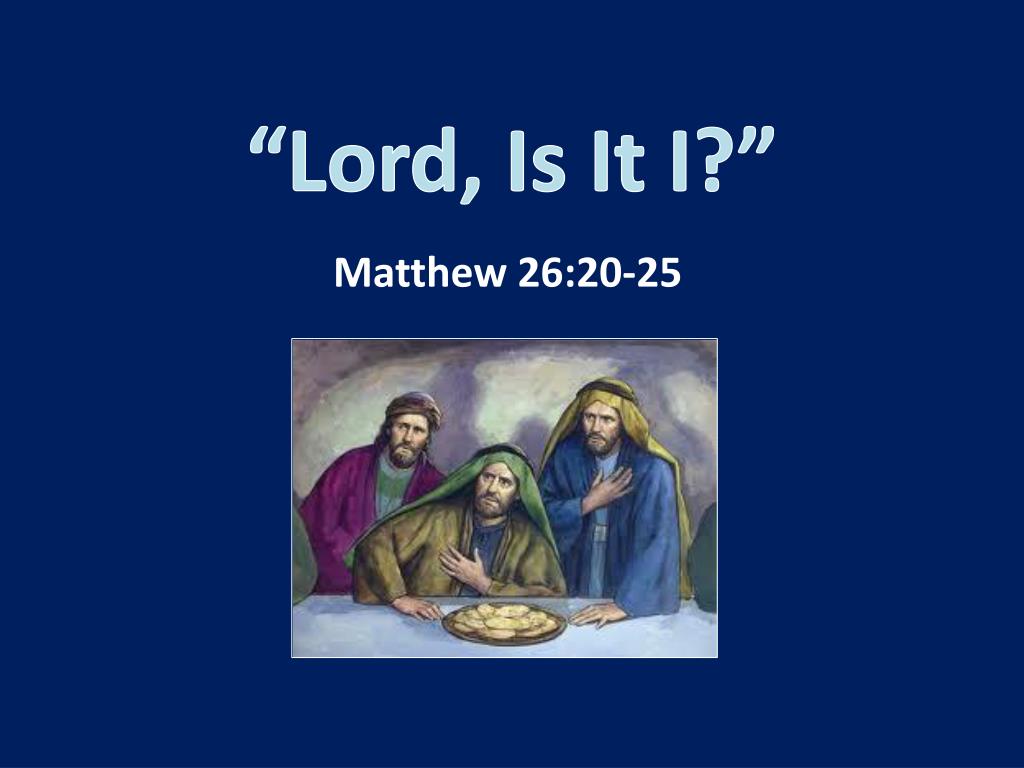
5. What have you personally found helpful in making the weekly sacrament ordinance meaningful and new each time?
This can be a challenge, when the same words are used each time and the same imperfect young men bless and pass the sacrament each week. Some possible helps could include:
- Reflect on the words of the just-sung sacrament hymn during the passing of the sacrament.
- Think of the love Jesus demonstrated for each of us by suffering an amount corresponding to all the pain and suffering we have ever experienced, deserved to experience, or caused others during our entire lives.
- Ponder each phrase of the sacrament prayer and its application. E.g.,
- What does it really mean to take upon us the name of Christ? How do we do that without making others uncomfortable? Or does their comfort matter?
- How do we “always remember” Him and still succeed in focusing our attention on our daily labors?
- What commandments do we need to work on more diligently?
- What practical difference would it make in our lives if we really had Christ’s Spirit with us always? How do we recognize that Spirit? What does it do for us?
- Listen for what spiritual messages the Lord may be trying to convey to each of us during the quiet time of the sacrament.
6. What do you consider to be the most significant Joseph Smith Translation contribution to the story of the first sacrament service?
To me it is the clarification that this was not a one-time event but the first of what was to become a regular ritual among the faithful. “And as they were eating, Jesus took bread, and blessed it, and brake it, and gave it to the disciples, and said, Take, eat of it; and a commandment I give unto you, and this is the commandment which I give unto you, that as you see me do, you shall do likewise in remembrance of my body.) (JST, Matthew 26:26). And I give unto you a commandment, that ye shall observe to do the things which ye have seen me do, and bear record of me even unto the end.” (Matthew 26:29)
7. What did the singing of a hymn add to the Last Supper? Why do we sing a hymn today just before partaking of the sacrament? (Matthew 26:30)
Presumably, the hymn during the Last Supper served much the same purpose as our sacrament hymns do today. They invite the Spirit through calm and beautiful music. And the lyrics provide thoughts on which we can reflect during the passing of the sacrament to make that experience more meaningful.
8. Where in modern scripture can we read more about the great latter-day “sacrament meeting” alluded to in Luke 22:16, Matthew 26:29, and Mark 14:25?
Footnotes from these passages should lead you to D&C 27:5-14, which talks at some length about this great future event and those who will be present for it.
9. What connection is there between Luke 22:24-30 and John 13:4-17, which is not immediately apparent unless one reads the two passages sequentially?
Jesus’ washing the feet of the apostles as a lesson in service immediately followed their arguing with each other about “which of them should be accounted the greatest.”
10. What was the purpose of Jesus’ washing each of the disciples’ feet? Wouldn’t it have been more efficient and teach more about personal responsibility to let each wash his own feet?
Jesus specifically told the apostles in John 13:14-15 that He had done it “as an example, that ye should do as I have done to you.” Typically, servants, not masters, would wash the feet of others. Jesus is once again trying to teach that the greatest among them were to serve, not dominate. In addition to serving the practical purpose of getting the dirt off the dusty feet of those present, the washing of feet on this occasion evidently served as a symbol of the cleansing power of the atonement. As Jesus told Peter, “If I wash thee not, thou hast no part with me.” He told them they would not understand that at present but would know hereafter. (John 13:7.)
11. What would a typical outsider say was the most characteristic attribute of a Latter-day Saint? That he doesn’t smoke or drink? That he’s devoted to his family? That he’s fanatical in his attendance at meetings? How successful have we been thus far in reaching the point that Jesus dreamed of that “by this shall all men know that ye are my disciples, if ye have love one to another”? (John 13:35.) Why aren’t we better known for that?
The two most obvious reasons why we aren’t better known for our love for others are:
- Many of us haven’t yet reached that ideal to the point that it is obvious to outsiders.
- Love is often demonstrated quietly, whereas other characteristics may be more visible to the onlooker.
12. Jesus had previously taught that one is to love his neighbor as himself. In what sense, then, is it a “new commandment” that He gives in John 13:34-35?
It is one thing to love others as much as we love ourselves, especially if we have an inferiority complex, but quite another to love as much as Jesus does. It is not enough to love others only as much as we love ourselves. We need to love them as much as Jesus loves us (and them). This, of course, will take divine help to accomplish.
